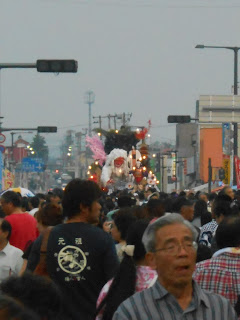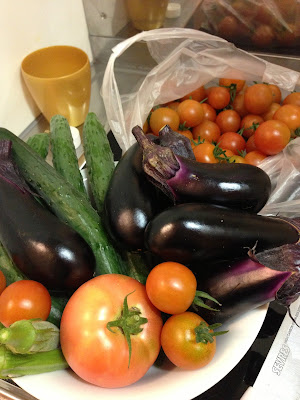One of the schools address my presence with more indifference than enthusiasm. It's not uncommon for me to wait until 10pm or later for the week's schedule with the lessons I need to prepare for. I've also shown up at the school with no schedule and have endured some seriously stressful scrambling to get a lesson together. This never feels good and usually makes for a lackluster lesson. This is also the school where, despite the fact that I gave my self-introduction to the staff in my very poor Japanese, they assume I don't know when they are talking about me. It feels like being in high school: looking up from my desk and noticing the head teacher talking to someone else and laughing and gesturing in my direction. Not awesome.
He is also the same teacher who either walks to class without me then proceeds to call me "gaijin" to the students or just doesn't walk to class with me at all and shows up halfway through the lesson. Those are actually the better days because without him there, I can relax.
But at the same school, some of the other teachers are much kinder. I can hold small conversations with some of the teachers at our desk cluster. And the students, although quieter than the other schools, are very sweet.
Fortunately, the company is good about supporting their teachers and I can talk to them about whatever is bothering me. Still, it's good to get out and just have some therapeutic time for yourself and what better way to go about it than spending a day at an onsen!
Limor, another ALT and a resident of Ofunato city, and I decided to hit up the famous and luxurious Hanamaki Onsen yesterday. This place is incredible! It's only about a half hour drive from Kitakami out in the mountains, surrounded by lush green forests and golden rice paddies. Three hotels connect to each other to form a large and tranquil complex where you can walk through the halls in your yukata from one onsen to another.
Limor and I met at Hotel Koyokan. There was a wedding happening later in the day: the lobby was full of men in shiny suits and women in beautiful kimono. While Limor and I sat and chatted over a cup of coffee, three little boys toddled around the lobby chasing one another until the party moved on. By then, it was onsen time. Limor had been there recently and recommended the public onsen upstairs.
She was right: it was amazing. We sat in a sheltered outside onsen with large natural rocks surrounding the pool and a hot waterfall in the center. We were surrounded by slender pine trees with deep red bark, glimpses of the sky just visible through the topmost branches.
We sat and talked for a long time, just two foreign women indulging in some traditional Japan. The rest of the day consisted of wandering through the shops outside the hotels and stopping in a cafe for a snack. We both had coffee and cake and had a wonderful surprise when the waitress struck up a conversation with us...in both Japanese and English! Her friend is studying in Washington D.C. and she was very interested to hear we were from America and New Zealand and working as teachers in Iwate. It's nice to meet people who are legitimately enthused to see a foreigner in their country.
After our lunch, we strolled up the hill to Hanamaki Onsen's rose garden. Unfortunately, just as we walked up, a shamisen player was leaving. The price for a cup of coffee was steeper than we thought.
 The garden was beautiful. We were both surprised at how many roses were still blooming this late in the season, and how many more are still budding! I'll definitely be going back to try and see them before the end of the season! We looked around the garden for a while and decided to take one more soak back at the hotel.
The garden was beautiful. We were both surprised at how many roses were still blooming this late in the season, and how many more are still budding! I'll definitely be going back to try and see them before the end of the season! We looked around the garden for a while and decided to take one more soak back at the hotel. 
 |
| I'm a Barbie Bride |
This little trip was desperately needed. I'm not going to say I'm cured: the therapeutic qualities of onsen are highly regarded in Japan but I think of it more like taking your One-a-Day vitamins. If you want to reap the benefits, you have to take your medicine regularly.
That's a pill I don't mind swallowing.









































